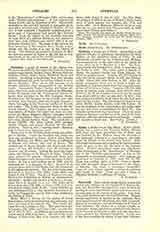

Cynewulf. — That certain Anglo-Saxon poems still extant were written by one Cynewulf is beyond dispute, for the author has signed his name in them by spelling it out in runic letters which may be so read as to make sense in the context of the poem. It is, however, quite uncertain who this Cynewulf was. Despite strong expressions of opinion to the contrary, there seems good reason for identifying him with Cynewulf, Bishop of Lindisfarne, though Professor A. S. Cook of Yale advocates the claims of a certain Cynulf, an ecclesiastic whose signature is attached to the Decrees of the Council of Clovesho in 803, and who may have been a priest of the Diocese of Dunwich. In any case it has been conclusively shown of late that Professor Cook’s chief reason for rejecting the bishop’s claim, viz. the supposed dependence of some of Cynewulf’s poems on Alcuin‘s “De Trinitate”, written about 802, is base-less. (See C. F. Brown in Pub’s. of Mod. Lang. Ass‘n. of N. Am., XVIII, 308.) Apart from conjecture our only certain knowledge about Cynewulf is derived from what he tells us of himself in the four runic passages. He had received gifts in a hall amid scenes of revelry, which may mean that he had been in youth a sort of gleeman or minstrel. He was converted, and had since then devoted himself to sacred song but now in old age he still dreaded the punishment of past sins. Four poems, the “Christ”, the “Elene”, the “Juliana” and the “Fates of the Apostles” may be attributed to Cynewulf with certainty in virtue of their runic signatures. The “Christ”, as it is preserved in “The Exeter Book”, the only manuscript containing it, is a glorification of three themes, the Advent of Christ, the Ascension, and His second coming upon Doomsday. As in all the other poems the writer shows literary gifts of a very high order and he must evidently, from his knowledge of earlier writers, especially St. Gregory, have been a man of considerable learning. In the “Christ” he paraphrases several of the anthems, known as the great O’s, in the Advent liturgy and in doing so introduces passages of much beauty breathing the most intense devotion to Our Blessed Lady (cf. 11. 33-49, 71-103, etc.), and differing little in feeling from the tone of such verses as those of Lydgate, six hundred years later. The poem also contains a remarkable testimony (11. 1307-1326) to the practice of confession. “Juliana”, also preserved to us in “The Exeter Book”, is a poetical version of the Acts of the martyrdom of St. Juliana. The “Elene”, with those next mentioned, became known only in 1836 upon the discovery of the Vercelli codex, an Anglo-Saxon manuscript in prose and verse, which for some unknown reason had found its way to Vercelli in Italy. The “Elene” is generally reputed Cynewulf’s masterpiece. It contains a narrative based on earlier Latin legends of the discovery of the true Cross by St. Helen. The “Fates of the Apostles” is a fragment chiefly important as forming a connecting link between Cynewulf who signs it, and the kindred poem “Andreas” in the same manuscript. This also is consequently by most authorities assigned to Cynewulf, though Knapp, its latest editor (Boston, 1906), regards it as the work of an imitator and possibly disciple of Cynewulf. Of the remaining works conjecturally attributed to this poet the beautiful “Dream of the Rood” is the most important. Some verses apparently derived from this allegory and engraved upon the famous Ruthwell Cross have led to much controversy regarding both the date of the monument and the authorship of the poem. Other doubtful works sometimes attributed to Cynewulf are the “Guthlac”, the “Phoenix” and certain riddles in “The Exeter Book.” It is safe to say that unless fresh evidence comes to light the authorship can never be settled.
HERBERT THURSTON

